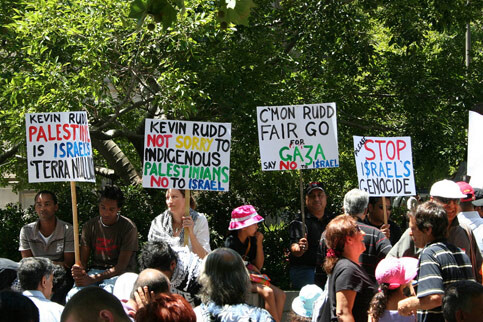The Electronic Intifada 26 June 2009

Australians in Melbourne protest Israel’s assault on the Gaza Strip that killed more than 1,400 Palestinians, January 2009. (Takver)
Australian Prime Minister Kevin Rudd and Deputy Prime Minister Julia Gillard have made no secret of their love for Israel.
Rudd, who leads the Labor Party, formally congratulated Israel in the Parliament on reaching 60 years of statehood in 2008. He forgot to mention the fact that Palestinians lost 78 percent of their land in 1948, millions have been refugees for the 60 years since and the rest live under Israel’s military occupation.
Gillard excused Israel’s massive attack on the Gaza Strip last January by pointing to the rockets Hamas had fired into Israel, killing fewer than 10 Israelis. She forgot to mention the fact that Israel, the US, the EU and the UN had decided to respond to Hamas’ democratic election victory as the Palestinians’ government by imposing a siege on the whole population, depriving them of fuel for cars, hospitals and heating and cutting back on food supplies. And she ignored the fact, Australia unlike even the British government, watched without complaint as Israel went on to slaughter 1,400 Palestinian civilians, including 400 children.
And now Gillard is in Israel leading a bevy of Australian business, media, political and cultural leaders to Israel in an official “cultural exchange!” I thought she ran the twin, heavyweight portfolios of industrial relations and education, not arts?
What’s happening, and why?
Well, Australia is sucking up to Israel once again, just like former prime ministers John Howard (Liberal) and Bob Hawke (Labor) did.
Certainly, this one-sided policy is not represented in Labor platform policy which is much more even-handed, committing the party to a two-state solution. Although, it’s interesting that in the last four years of the Rudd ascendancy all reference to the original UN resolutions that defined Labor policy since 1948 — guaranteeing an end to the 1967 occupation and right of return of the 1948 refugees or compensation — have been quietly deleted.
But the last prime minister to ever have an even-handed policy on this issue was Gough Whitlam (1972-75), a fact that annoyed the local Israeli lobby to no end when the 1973 Arab-Israeli war occurred.
So why the one-sidedness, ignoring the platform and the Gough legacy?
To find out one possible answer, the little Sydney-based pro-Palestine lobby group which I chair called Coalition for Justice and Peace in Palestine decided we would commission a high class, well-known, opinion poll company to test whether the Labor machine or politicians knew something we didn’t — for example, that their one-sidedness reflected “the will of the people.”
Were Palestine and Palestinians so on the nose — as Muslims, as Arabs, as “terrorists,” pick your nightmare — that showing government sympathy towards them would hurt you electorally?
We chose the Roy Morgan Research company and they agreed to do an arm’s length national, representative survey asking five crucial questions about awareness and knowledge, about overall sympathies, about the Gaza military action in January and about perceptions of the Rudd government’s attitudes.
The results were a big surprise. They are the epitome of even-handedness, with a bit of a tilt in overall sympathies toward the Palestinians. And on Gaza, many more Australians found the Israeli military action in Gaza unjustified (42 percent) than justified (29 percent).
So Labor’s cuddle-up to Israel does not fit with Australians’ views.
Interestingly, the survey also found that many Australians don’t in fact see the Rudd government as one-sided (42 percent) though of the 20 percent who do, 19 percent think it is tilted towards Israel.
There are two other points to make.
First, if you break the national figures down in to Sydney figures, a bias towards the Palestinians comes through clearer. This could be a result of the big Australian Arab and Muslim populations in Sydney. But, in any case, the sympathy towards Palestine is stronger and the condemnation of the Gaza war much stronger (49 percent thought it was unjustified, only 24 percent justified).
So Sydney is a pro-Palestine bastion.
Second, Morgan asked respondents whether they felt they knew “a lot,” “a fair amount,” “not very much,” “nothing at all” or “can’t say” about what happened in Gaza. If you group “a lot” and “fair amount” — in other words, those who felt they knew at least a fair amount or more about what happened — and break them down into their sympathies for the Israelis or the Palestinians, the bias towards the Palestinians is quite marked (29.7 percent for Israelis, 44.5 for Palestinians).
I take from that, that the more you know about the Israel-Palestine situation, the more your sympathies lie with the Palestinians.
Where does this leave the Labor Party? Or the opposition Liberals for that matter?
It means they have to re-align themselves with their electorates. It means the National Australian Labor Party Conference next month should ignore Kevin Rudd’s obsequious attitude to everything Israeli — did he really say “Israel is in my DNA!” at a Jewish community function? — and get on with strengthening its adherence to peace and justice in the region.
Julia Gillard should also cancel her tour of Israel — how many days is she spending in the Occupied Palestinian Territories with Palestinian guides? — and plead “pressure of work.” Or a more believable reason would be: do as Obama says and end settlement-building and I’ll come and see you.
That’s the kind of relationship the United States is forging right now with Israel. Maybe Rudd and Gillard, who seem to have trouble listening to what their own electorate thinks of Israel, need to pick up the phone to Obama for instructions.
Peter Manning is Convenor of Coalition for Justice and Peace in Palestine and Adjunct Professor of Journalism at University of Technology, Sydney.


